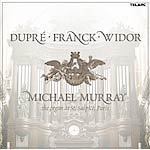
Dupre, Franck & Widor-Organ Works
 $33.29
Out of Stock
$33.29
Out of Stock6+ weeks add to cart
Dupre, Franck & Widor-Organ Works
Michael Murray at the Organ at St. Sulpice, Paris
[ Telarc Records / CD ]
Release Date: Tuesday 28 May 2002
This item is currently out of stock. It may take 6 or more weeks to obtain from when you place your order as this is a specialist product.
Michael Murray was the first solo artist on Telarc
Michael Murray was the first solo artist to be recorded on the Telarc label. His earliest recording for Telarc founders Robert Woods and Jack Renner was an LP made in 1972, even before the two partners took on the Telarc name, in what was then considered to be a ground-breaking format—quadraphonic stereo. The recording was made at Saint Meinrad and consisted of works by Cesar Franck. Now, thirty years later, Telarc and Murray are repeating history, with a brand new recording of French organ music, made in an historic venue with cutting-edge technology, DSD (Direct Stream Digital). This new recording process enables Telarc to release Murray's recording not only as a sonically superior stereo CD, but also in the discrete, six-channel surround sound format SACD (Super Audio Compact Disc).
The three great organist/composers whose works are represented on this recording all have connections with the organ at St. Sulpice in Paris. Cesar Franck was among the performers at the organ's inauguration; Widor became the church's organist, and his composition pupil Dupre was first Widor's assistant and later organist in his own right. Each of these three venerated artists also became professor of organ at the Paris Conservatoire.
Dupre trained Murray, whose twenty-nine previous recordings for Telarc are among the classical music industry's worldwide best sellers. Murray has played the historic instrument at St. Sulpice many times, and was thrilled to make this recording. "Albert Schweitzer called the St. Sulpice organ the most beautiful organ in the world," said Murray, "and for many years after its inauguration in 1862 it was also the largest organ in the world." Carefully restored about ten years ago, the instrument is one of only a few masterpieces built by the great French builder Aristide Cavaille-Coll to remain intact. Murray believes that the organ's 102 stops, controlled from five manuals, probably sound as magnificent now as they did when they were new.
Featured on this recording are some of the great gems of the late nineteenth and early twentieth-century French organ literature. Franck's majestic Grand Piece symphonique, written in four contrasting movements, is considered to be the prototype for the organ symphony form, later brought to its full glory by Widor.
Widor admitted that "Cavaille-Coll's royal instrument" inspired him to compose his organ symphonies. Included here is the virtuosic Finale from Widor's Symphony No. 6, Op. 42.
Marcel Dupre became renowned throughout the world not only as a performer but also for his incredible skills of improvisation. In his ten transcontinental recital tours of North America, he would close his programs with improvisations on themes submitted to him only moments in advance. His works for organ, both sacred and secular, remain staples of the organ repertory. Featured on this recording are a brilliant Magnificat and an Antiphon (both from the 15 Pieces, Op. 18); the Carillon, Op. 27 No. 4; Choral et Fugue, Op. 57; the magnificent Cortege et Litanie, Op. 19, No. 2; and the Final, Op. 27, No. 7.
Prior to this recording, Michael Murray's most recent Telarc disc was made in 1996, featuring works of J.S. Bach performed at Zwolle (CD-80385). Dr. Murray's three books include a life of his teacher: Marcel Dupre: The Work of a Master Organist, which ran to three printings in English, was a selection of the Performing Arts Book Club, and has been published in German and French. He has also written Albert Schweitzer, Musician; and French Masters of the Organ. His edition of A Jacques Barzun Reader was published by HarperCollins in January 2002.
Tracks:
Marcel Dupre (1886-1971)
1. Magnificat VI: Gloria (Finale), Op. 18, No. 15
2. Carillon, Op. 27, No. 4
3. Choral et Fugue, Op. 57
4. Antiphon III: Tres lent et sans rigueur, Op. 18, No. 3
5. Cortege et Litanie, Op. 19, No. 2
6. Final, Op. 27, No. 7
Cesar Franck (1822-1890)
7. Grande Piece symphonique, Op. 17 (complete)
Charles-Marie Widor (1844-1947)
8. Symphony No. 6, Op. 42: Finale